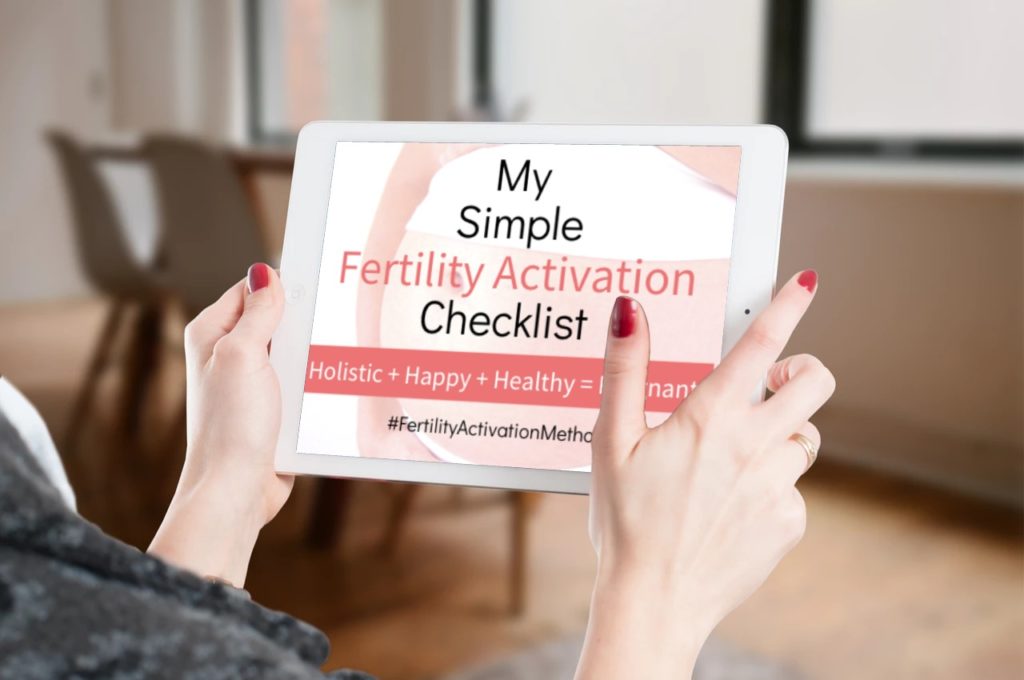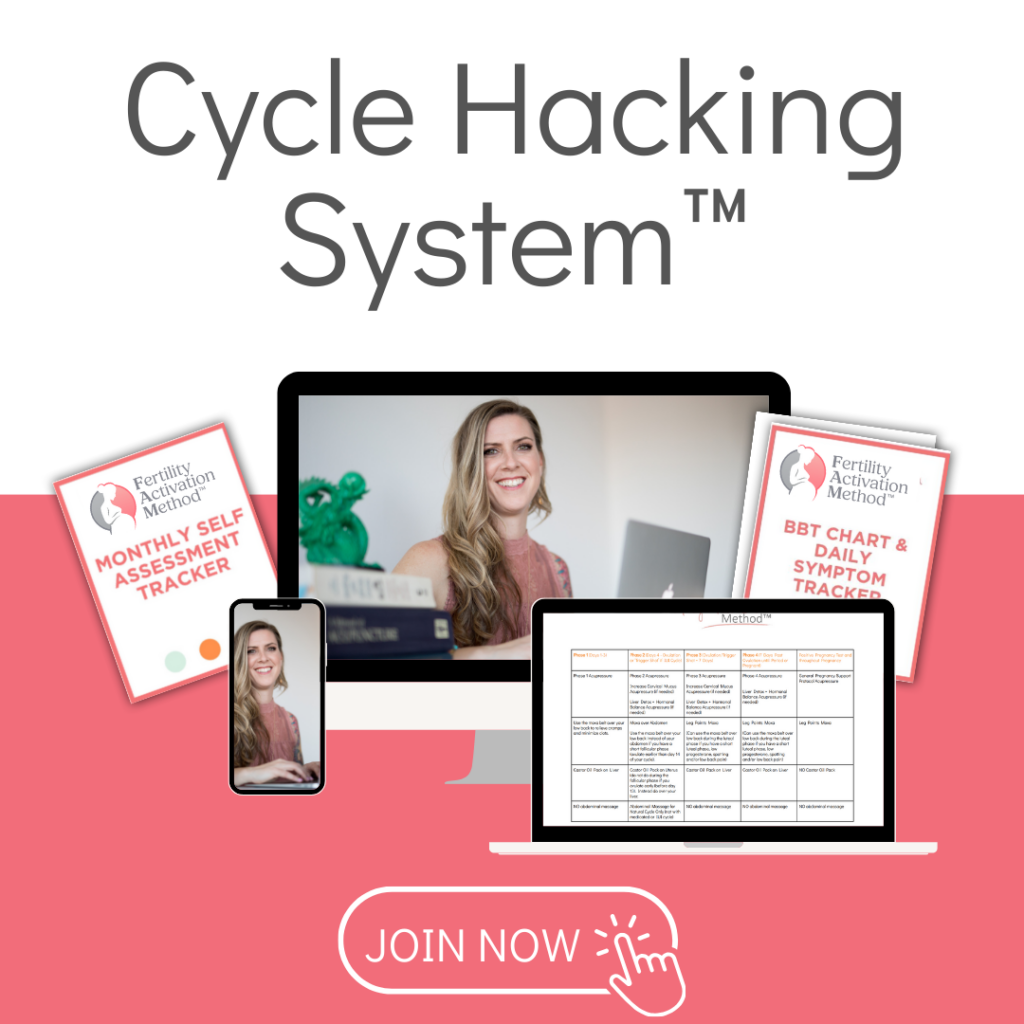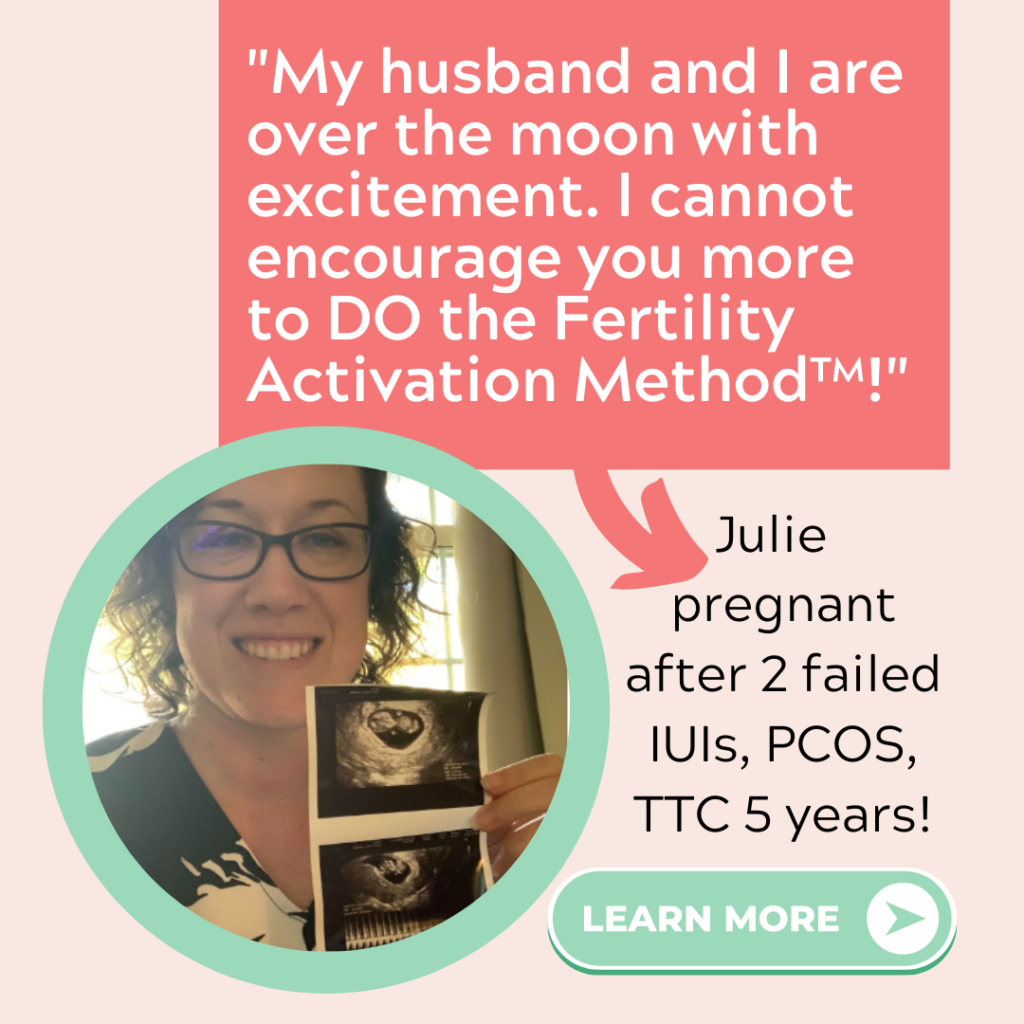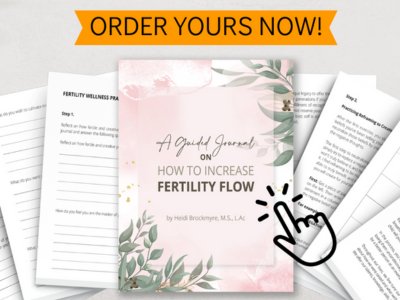
WANNA GRAB MY
FREE & SIMPLE
FERTILITY ACTIVATION CHECKLIST?
Follow these simple steps & get pregnant the easier, healthier & more affordable way!

WANNA GRAB MY FREE & SIMPLE FERTILITY ACTIVATION CHECKLIST?
Follow these simple steps & get pregnant the easier, healthier & more affordable way!
How Long Should I Wait To Conceive After A Miscarriage?
There are a lot of mixed messages out there about how long you should wait to conceive after you’ve had a miscarriage.
Sometimes doctors say you need to wait at least 3 months.
Sometimes doctors say you’re more fertile after a miscarriage.
Watch my video for what I tell my patients on how long they should wait to conceive after they’ve had a miscarriage.
What I tell women, my clients, my patients, is usually to wait some amount of time, but it often depends on the full picture. What was most likely the cause of the miscarriage? How far along were you in your pregnancy before you miscarried, and how much preparation did you do before you got pregnant?
So it’s not always a one size fits all situation.
Generally, however, let’s say you have had multiple miscarriages. For instance, I had a woman who came to me and she’d had five miscarriages. And she would always miscarry very early on in the pregnancy, shortly after she got a positive pregnancy test. Now, in this case, her body clearly was not ready to sustain pregnancy. And the doctors were just telling her, “Well you just got to keep trying. You just got to keep trying and hopefully one of these will stick.”
But obviously, that’s not really ideal if she’s trying, getting pregnant, miscarrying again and again and again. Who wants to miscarry over and over again? No. So in that case I told her, “You need to prepare your body for a total of three months before you try to conceive again because you don’t want to keep miscarrying.” And so she did. She followed my recommendations for three months. She avoided getting pregnant, and then I gave her the green light. Her cycle, her body seemed ready, and she was able to get pregnant, and that pregnancy stuck and resulted in a healthy baby girl.
So, in a case like that, if you’ve had recurrent miscarriages, and your body, your health, is not changing between the miscarriages, something’s not changing, then I would not recommend that you try right away without first implementing a plan to prepare your body so that it’s ready to sustain a healthy pregnancy that’s going to be lasting. Because ultimately you’re going to lose time if you keep trying and miscarrying. So a lot of times women are anxious to not to try to conceive for one, two, three cycles because of the ever impending biological clock that’s ticking and the worry about time passing, or just feeling really anxious and just not wanting to miss any opportunities.
But you can end up actually losing more time if you get pregnant, and your body’s not prepared to sustain a healthy pregnancy, and then you lose it again, which will set you back. So now if you’ve just had say one miscarriage, and it was pretty early on, then you don’t necessarily need to wait a full three cycles before trying again.
If you’ve had a miscarriage that was later in the pregnancy, after eight weeks or longer than that, then your body’s just naturally going to need to some time. Most women don’t go right back into a regular cycle after a miscarriage that’s a bit further along in the pregnancy where there’s a lot of… There were more hormones and there was tissue to expel and so forth. So if anything, you’re going to need to support your body to get back into a natural rhythm anyways.
But what I would emphasize more than anything, is that if you miscarried, then there’s likely a reason why.
This is not at all to imply that you are at fault by any means, or to blame, or it’s because you didn’t do something or you did do something. No, no, no, no. However, there are things that you can do to support your body to be in a better position to be able to have a healthy and lasting pregnancy.
Now miscarriage is quite common and it happens to many, many, many women. More women than we’re aware of. We just don’t talk about it. It’s kind of a taboo subject in our culture, right? And I think miscarriage is actually quite natural for a woman in her reproductive career. In all of the years that she’s fertile, and possibly trying to get pregnant, or getting pregnant, having babies and so forth, it is not necessarily unhealthy at some point along the way to have a miscarriage. It’s just kind of a numbers game, and the body’s not perfect. Our eggs aren’t perfect, sperm’s not perfect, not all embryos are going to be viable and perfect, and so it is a natural healthy process for the body to say, “Oh, this one’s not the healthiest. This one’s not going to result in a healthy human life.” So the body’s naturally going to discard that particular pregnancy.
Now having a miscarriage is not necessarily indicative of being unhealthy in your reproductive system.
But, if you have more than one miscarriage, or maybe the miscarriage is an indication of a greater imbalance in your reproductive health and also your whole system health, your whole body health, that did make you more likely for the pregnancy to result in a non-viable pregnancy.
So basically it’s an indication that there are steps that you can do to set yourself up for increased chances of a viable, healthy pregnancy. And there’s no set rule in stone, everybody needs to wait exactly three months after a miscarriage before you start trying again.
Does it make you more fertile to have a miscarriage? I wouldn’t say that exactly. The idea is that hormones were stimulated, implantation occurred, so somehow your body has gotten the hang of pregnancy and is maybe still in that mode. But again, that’s really a very case by case situation.
A lot of women who have been on birth control for many years, than when they initially get pregnant after going off the pill I see, or having had an IUD in, if they’ve had the IUD removed, and then get pregnant, I often see the first time they get pregnant that they miscarry. Because for one thing, the hormones were not in rhythm, they hadn’t been able to pick up and get into a natural rhythm after having been on the pill for so long and having that rhythm kind of dictated through these synthetic hormones.
Also birth control hormones actually inhibit blood flow to the uterus. So, a lot of times women’s uterine linings are very thin and they aren’t getting enough circulation. They just aren’t ready to be able to sustain a pregnancy, and it just takes more time for the uterine lining to get nice and thick and plush and get that nice triple layer and so forth. That’s why a lot of times women, when they’re on the pill or any form of birth control, they have very, very light periods, or maybe even skip periods and so forth, because that circulation to the uterine lining is just not what it would naturally be. And for this reason, oftentimes the first pregnancy is just not viable, or it’s not able to really thrive in that environment.
However, getting pregnant does help to maybe stimulate some of that hormonal rhythm and circulation to the uterine lining. So, in some cases, a pregnancy could create a more fertile environment, but not in all cases. Again, it really depends on what was the reason for the miscarriage. Is your body just not actually ready to sustain a pregnancy? Maybe there’s a lot of exhaustion. Maybe there’s adrenal fatigue. Maybe there’s hormonal imbalances so the hormones are not ready to actually sustain the pregnancy. Maybe there’s lack of circulation to the uterine lining. Maybe the egg quality is poor, the sperm quality was poor, so that the embryo quality is not that great. Maybe it wasn’t a viable embryo. And therefore if it’s an egg quality issue, there needs to be more done in a 90 day period for the egg to be … That’s the duration through which an egg is maturing, and it’s needs a healthier environment so it’s a healthier egg so it can create a more viable embryo.
So again, it’s a case by case situation. But you can never go wrong by doing whatever is possible to prepare for pregnancy. A lot of women will come to me and say, “Uh-oh, I’m afraid I’ve miscarried,” or, “I’ve miscarried in the past. I’m pregnant now. I want to make sure that I don’t miscarry.” Certainly there are things that you can do to support the pregnancy once you are pregnant and you want to continue to support the pregnancy. But really, the key is to prepare your body in advance, both you and your partner, because those are the ingredients that are going to go into the pregnancy. So the better quality ingredients you have, and the better environment that is ready to sustain the pregnancy, the more likely your pregnancy is going to succeed.
So it’s really on the front end of conception, pre-conception, is where so much of the focus is. So you kind of got to weigh things out before you got pregnant…
How healthy were you? How healthy was your cycle? How early did you miscarry? Have you miscarried before? These are the questions that you can ask yourself to determine, Do you need more time? before you try to get pregnant again, to help your body, prepare your body, to be able to sustain a healthy pregnancy. What did you do to prepare for this pregnancy? What can you do now to prepare for your pregnancy?
So, I know that’s not a clear black and white answer, and we all want clear black and white answers when it comes to most things in life, and especially fertility, but like so many things in life it just doesn’t work that way.
P.S. Wanna learn more? Watch my FREE 4-Step Fertility Reset Masterclass by going HERE. My proven baby-making strategy that works no matter what you’ve tried before, how old you are or how messed up you think your fertility is (I’ve seen it all!)!





